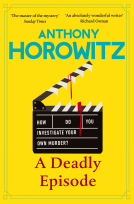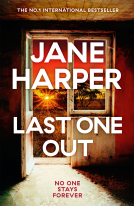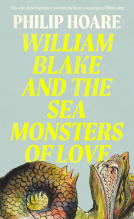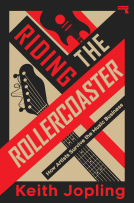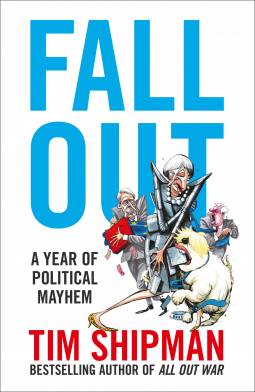
Fall Out
A Year of Political Mayhem
by Tim Shipman
This title was previously available on NetGalley and is now archived.
Send NetGalley books directly to your Kindle or Kindle app
1
To read on a Kindle or Kindle app, please add kindle@netgalley.com as an approved email address to receive files in your Amazon account. Click here for step-by-step instructions.
2
Also find your Kindle email address within your Amazon account, and enter it here.
Pub Date 30 Nov 2017 | Archive Date 28 Feb 2018
HarperCollins UK, 4th Estate | William Collins
Description
The unmissable inside story of the most dramatic general election campaign in modern history and Theresa May’s battle for a Brexit deal, the greatest challenge for a prime minister since the Second World War.
By the bestselling author of All Out War, shortlisted for the Orwell Prize 2017.
This is the unmissable inside story of the most dramatic general election campaign in modern history and Theresa May’s battle for a Brexit deal – the greatest challenge for a prime minister since the Second World War.
Fall Out tells of how a leader famed for her caution battled her bitterly divided cabinet at home while facing duplicitous Brussels bureaucrats abroad. Of how she then took the biggest gamble of her career to strengthen her position – and promptly blew it. It is also a tale of treachery where – in the hour of her greatest weakness – one by one, May’s colleagues began to plot against her.
Inside this book you will find all the strategy, comedy, tragedy and farce of modern politics – where principle, passion and vaulting ambition collide in the corridors of power. It chronicles a civil war at the heart of the Conservative Party and a Labour Party back from the dead, led by Jeremy Corbyn, who defied the experts and the critics on his own side to mount an unlikely tilt at the top job.
With access to all the key players, Tim Shipman has written a political history that reads like a thriller, exploring how and why the EU referendum result pitched Britain into a year of political mayhem.
Available Editions
| EDITION | Ebook |
| ISBN | 9780008264390 |
| PRICE | £5.99 (GBP) |
| PAGES | 272 |
Average rating from 5 members
Featured Reviews
 Richard F, Reviewer
Richard F, Reviewer
Tim Shipman’s new book, Fall Out, follows on from his previous account, about the referendum campaign. This new work picks up where All Out War ended, and brings us as far as Theresa May’s catastrophic speech at the Conservative Party Conference.
We’ve been here before, of course, with Andrew Rawnsley’s detailed descriptions of the dysfunctions of New Labour. Shipman’s accounts will be the first place to which people turn to piece together what happened within the governments of 2015 onwards. His contacts within the Conservatives are impeccable and within Labour passable. But while Rawnsley was able to present a government that was largely, in the early days, coherent, Shipman describes in-fighting, delusion, incompetence and betrayal. He is conscientious to present both sides: when criticising one or other player he will provide the case for the defence. The result is to remind the reader of Thackeray’s Vanity Fair the subtitle of which is ‘A novel without a hero’. We wish this were a novel and not actual fact. These are times when we could really do with a hero and Shipman’s book makes it frankly clear that there are no obvious candidates.
If there are no heroes there are plenty of villains. The most prominent were Theresa May’s aides Fiona Hill and Nick Timothy. There’s no shortage of anecdotes illustrating this pair’s arrogance and unfitness to be near high office. (I voted Remain, said Hill, but Brexit will be brilliant because I will personally make it so.) Indeed, their presence underscores one of the main fault lines in Theresa May’s premiership: they were alongside the PM when she was at the Home Office and assumed that the skills and ways of working they’d learned could be transferred wholesale to Number 10. Shipman describes how, rather than tell a compelling story to bring a divided country together, their approach to communications was haphazard at best and destructive at worst, more suited for a bunker-style government. ‘We don’t feed the beast,’ said Hill. The problem was that May was unable to paint a picture of the country she wanted to build; by the time of the general election it was too late.
Under different circumstances, it might have been smart to call the general election. If Theresa May had done the groundwork in terms of policy and presentation, if anyone had been in sole charge of the campaign, if Conservative headquarters had been ready, if May had been a better campaigner. Shipman is good and detailed on this – and on the tensions within Labour too. Labour is often described as a party that can’t get over its past – in particular the Blair government – but I hadn’t realised until reading this just how the Tories were equally self-destructive. May’s style of government was to be the UnCameron, and Team May were startlingly happy to throw away the gains provided by Cameron’s ability to attract votes from minorities and his campaigning discipline. Out went the amazing cyber campaign developed in the 2015 election. In came references to fox hunting and grammar schools.
It’s perhaps understandable why this strategy might have been pursued. The 2015 manifesto is regarded as a document full of policies the Conservatives had expected to trade away in coalition talks. This had already bitten May and her chancellor Philip Hammond. So Ben Gummer and Nick Timothy wrote a document that was good for governing – but not for politics. Labour’s manifesto was arguably the opposite. The Labour party, which had entered the campaign on the rocks, knew that it was fighting for survival. So the various wings of the party stopped pointing their weapons at each other. Whether they supported Corbyn or not, each wing wanted to maximise the number of individual Labour MPs.
The election campaign has been much discussed and the set-pieces are well known. But Shipman makes the point that people were prepared to give May a fair hearing. It follows that they had (in the absence of any real narrative) projected their own ideas has to who she was. It was not inevitable that when detail was required she would be found wanting.
The result, of course, was that the election – which was expected to lead to more Labour bloodletting – actually led to a huge amount of Tory plotting. Shipman is very clear that Boris Johnson was back on manoeuvres. Shipman suggests that Johnson had not wanted a 2017 election because he was playing the long game and preparing to have another leadership bid in 2019. It’s worth an aside – if Johnson had backed Remain and Remain had won, he would probably be foreign secretary now, but with the old FCO intact and not having lost the international trade bits. That Johnson has been one of the losers of Brexit is an interesting irony.
There’s another parallel with Vanity Fair: the original bad apple in Thackeray’s masterpiece is George Osborne. Modern Osborne has defined himself by his opposition to Brexit and his personal resentment of Theresa May – whose sacking of Cameron’s chancellor and heir apparent was famously not done gently. As a result, Osborne is regarded by some as a hero of the centre. I don’t see it that way: Osborne’s ‘punishment budget’ is believed to have sent many 2016 voters to the Leave column but in any case Osborne’s lacklustre but highly partisan application of austerity cannot but have increased the sense of hopelessness in Leave-backing areas. He struts around in the margins of this book but Shipman seems to believe that the former next prime minister has lost his chance.
This book is required reading for anyone wanting to know where the country is headed, and why. It may even unite Remainers and Brexiters in derision at the shambles described. There is so much detail that a review of this length just can’t cover.
It is by necessity a different book from All Out War. There is no natural close. I think that Shipman lets slip a preference towards Brexit (but it’s slight and I was looking for it). I also think he’s better this time on the media – quicker to call out the Mail for their ludicrous headlines. Something he doesn’t say but I wonder about having read his book is whether the more right wing papers’ over-the-top coverage has become counter-productive: for example, the favourable spin the Mail initially gave the Tories’ social care proposals meant the the policy itself came under greater scrutiny which it was unable to bear.
I read this book in the run-up to the Budget. It gave considerable context to the stories that Nick Timothy was, through his Sun column, trying to undermine Philip Hammond. This is both an advantage – we see what the current players are up to – but it can also disillusion the reader. Let’s turn a final time to Thackeray, who ended his magnum opus with a paragraph with which I think Shipman – and all of us – should have some sympathy:
Ah! Vanitas Vanitatum! Which of us is happy in this world? Which of us has his desire? or, having it, is satisfied? – Come, children, let us shut up the box and the puppets, for our play is played out.
If only.
 Susan R, Reviewer
Susan R, Reviewer
I must admit that I still have not got around to reading Tim Shipman’s previous book, “All out War,” about the Brexit referendum, but it is certainly a book that I will get to. I did read, “Unleashing Demons,” by Craig Oliver and that was very interesting, but, on reflection, I think Shipman’s book would have been more balanced, as he looks at all the various political parties and does not tell the story from the point of view of any one person or political outlook. In this book, Shipman does an excellent job of recounting events from all sides of the political spectrum and is always fair and reflective.
Taking us from June 2016 to October 2017, this begins with the disastrous, and unnecessary, election, which led to a hung Parliament. Theresa May asked for a mandate from the British people; expecting that she would gain a larger majority and go into the Brexit negotiations strengthened. Instead, she was left stranded, her two main advisors – Nick Timothy and Fiona Hill – forced out , among accusations of bullying, and her government weakened; while her position as Prime Minister stood on shaky ground. Admittedly, when she called the election, her lead was so strong that she, and her party, felt able to celebrate what looked like a certain win. In this book, Shipman looked at how, and why, it all went so horribly wrong.
Having touched on the aftermath of the election results, this book takes us back to the Brexit vote. Plainly, there was no plans made by David Cameron’s government for Brexit. He anticipated a Remain win and then abandoned ship when he didn’t get what he expected – something, which, judging by this book, he may now regret. May does not come across as comfortable with making decisions, or dealing with situations she finds difficult, and upset Cameron by not seeking his advice.
You could say that, if May did not need to call an election, then Cameron did not really need to resign, but it is obvious that decisions in government are no less personal than in any other office environment. Indeed, the amount of back biting, secrecy, plotting and bullying, within all the political parties (but particularly in Downing Street) is, frankly, shocking. Although Shipman is careful to always present both sides of an argument, including much written about Nick Timothy and Fiona Hill. if even a quarter of the stories told within these pages are true, they would lead anyone in any work environment to be immediately sacked.
It is obvious that there are a lot of big personalities in the Conservative government and Shipman looks at Boris Johnson, Michael Gove, Philip Hammond, David Davis and others. Looking at it purely objectively, in personal – and not political – terms, it seemed to me that Philip Hammond was treated appallingly by May’s advisors, that Boris Johnson was pretty much used (blamed for anything that went wrong, but trotted out for any events where ‘personality’ was required), that Amber Rudd was thrown in at the deep end, having to present unpopular Conservative policies, even though she had been very recently bereaved, and that virtually everyone was out for themselves, while trying desperately to walk the tightrope of appearing to be loyal to the PM, while keeping one eye on political advancement. Gove does not enter the picture until later, of course, while Shipman also follows the story of well known former ministers, such as George Osborne; gleefully causing mischief and mayhem in the background.
Shipman covers all the main events in Theresa May’s first year as Prime Minister. Her unpopular visit, (with most of the public), to see Trump, after his shock Presidential win (I still have huge problems putting the words ‘Trump’ and ‘Presidential’ in the same sentence…), the constant dissent about Brexit, her difficulty in selling an unpopular manifesto, her lack of personal charisma and her inability to show empathy (to be fair, I don’t think she is a cold person and there are lots of examples of her being very kind to those around her, but she comes across as being impersonal and stand-offish, which is pretty unappealing when she has to be in the public eye). It is also obvious that, when she decided to call an election, neither she, nor the Conservative Party were ready. No manifesto, a hastily written manifesto, then a manifesto which turned voters away in droves, with unpopular policies, confusion and too much control over what was released, when and by who. Frankly, you expect better from people who are supposed to be running a country. If you decide a call a snap election, it would make sense to have at least prepared for it, or have some kind of plan.
Meanwhile, the Labour Party, although also very divided, seemed much more aware of what they needed to do to get votes. Although they had their own issues, with secrecy between different factions and a farcical leaking of their own manifesto, they realised the importance of social media and Jeremy Corbyn seemed much more comfortable in front of the cameras and was less easily rattled than May by difficult questions. As the Tory lead fell, to many people’s surprise (including many in the Labour Party), the Labour lead started to increase.
The result of the election left Tories devastated, but also depressed many Labour members, who disliked the fact that the hard left had done so well. While the Conservatives pondered who could be Prime Minister if Theresa May was forced out, many Labour supporters realised they would be unable to force out Jeremy Corbyn… Indeed, had the Conservatives not done so well in Scotland, he may well have been Prime Minister. What followed the election was, of course, the ‘blame game,’ and the battle for political survival, with internal squabbles on both sides. What was interesting was that the fight was, largely, between the two main parties, with other political parties fighting over a much smaller vote share.
This book takes us virtually up to the present (this review being written in November 2017). It is clear that events are still very fluid and there will probably be a lot more political upheaval to come. I would imagine that Tim Shipman may well need to make this a trilogy. Well written, highly recommended and engrossing, I recommend this book highly. I received a copy of this book from the publisher, via NetGalley, for review.
Readers who liked this book also liked:
Philip Hoare
Arts & Photography, Biographies & Memoirs, Nonfiction (Adult)
Keith Jopling
Arts & Photography, Biographies & Memoirs, Business, Leadership, Finance
Philippe Margotin, Richard Morton Jack
Arts & Photography, Biographies & Memoirs, Entertainment & Pop Culture

